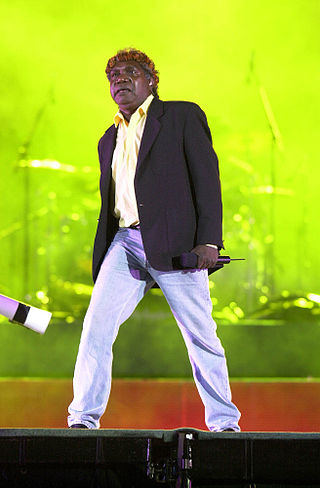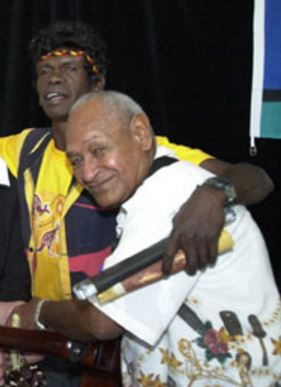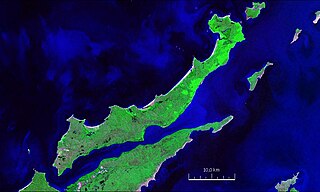
Mandawuy Djarrtjuntjun Yunupingu, formerly Tom Djambayang Bakamana Yunupingu, and also known as Dr Yunupingu, was a teacher and musician, and frontman of the Aboriginal rock group Yothu Yindi from 1986. He was an Aboriginal Australian man of the Yolŋu people, with a skin name of Gudjuk.

Arnhem Land is a historical region of the Northern Territory of Australia, with the term still in use. It is located in the north-eastern corner of the territory and is around 500 km (310 mi) from the territory capital, Darwin. In 1623, Dutch East India Company captain Willem Joosten van Colster sailed into the Gulf of Carpentaria and Cape Arnhem is named after his ship, the Arnhem, which itself was named after the city of Arnhem in the Netherlands.
Djalu Gurruwiwi, written Djalu, was a Yolngu musician, artist, and leader from Arnhem Land in the Northern Territory of Australia. He was globally recognised for his acquired skill as a player, maker, and spiritual keeper of the yiḏaki. As a respected artist with many of his works in several galleries, he aimed to spread his culture and traditions past his own community.

Indigenous music of Australia comprises the music of the Aboriginal and Torres Strait Islander peoples of Australia, intersecting with their cultural and ceremonial observances, through the millennia of their individual and collective histories to the present day. The traditional forms include many aspects of performance and musical instrumentation that are unique to particular regions or Aboriginal Australian groups; and some elements of musical tradition are common or widespread through much of the Australian continent, and even beyond. The music of the Torres Strait Islanders is related to that of adjacent parts of New Guinea. Music is a vital part of Indigenous Australians' cultural maintenance.

Galarrwuy Yunupingu, also known as James Galarrwuy Yunupingu and Dr Yunupingu, was an Indigenous Australian activist who was a leader in the Aboriginal Australian community. He was involved in Indigenous land rights throughout his career. He was a Yolngu man of the Gumatj clan, from Arnhem Land in the Northern Territory. He was the 1978 Australian of the Year.

The Yolngu or Yolŋu are an aggregation of Aboriginal Australian people inhabiting north-eastern Arnhem Land in the Northern Territory of Australia. Yolngu means "person" in the Yolŋu languages. The terms Murngin, Wulamba, Yalnumata, Murrgin and Yulangor were formerly used by some anthropologists for the Yolngu.
The Gove Peninsula is at the northeastern corner of Arnhem Land in the Northern Territory of Australia. The peninsula became strategically important during World War II when a Royal Australian Air Force base was constructed at what is now Gove Airport. The peninsula was involved in a famous court case known as the Gove land rights case, when local Yolngu people tried to claim native title over their traditional lands in 1971, after the Australian Government had granted a mineral lease to a bauxite mining company without consulting the local peoples. Today the land is owned by the Yolngu people.

George Rrurrambu Burarrwanga, known in life as George Rrurrambu and George Djilangya, was known as the frontman of Warumpi Band, an Aboriginal rock band.

Yirrkala is a small community in East Arnhem Region, Northern Territory, Australia, 18 kilometres (11 mi) southeast of the large mining town of Nhulunbuy, on the Gove Peninsula in Arnhem Land.
The Yirrkala bark petitions, sent by the Yolngu people, an Aboriginal Australian people of Arnhem Land in the Northern Territory, to the Australian Parliament in 1963, were the first traditional documents prepared by Indigenous Australians that were recognised by the Australian Parliament, and the first documentary recognition of Indigenous people in Australian law. The petitions asserted that the Yolngu people owned land over which the federal government had granted mining rights to a private company, Nabalco.

Elcho Island, known to its traditional owners as Galiwin'ku (Galiwinku) is an island off the coast of Arnhem Land, in the Northern Territory of Australia. It is located at the southern end of the Wessel Islands group located in the East Arnhem Region. Galiwin'ku is also the name of the settlement where the island's largest community lives. Elcho Island formed part of the traditional lands of the Yan-nhaŋu, according to Norman Tindale. According to J. C. Jennison, the Aboriginal inhabitants were the Dhuwal, who called themselves the Kokalango Mala

Yolŋu Matha, meaning the 'Yolŋu tongue', is a linguistic family that includes the languages of the Yolngu, the indigenous people of northeast Arnhem Land in northern Australia. The ŋ in Yolŋu is pronounced as the ng in singing.
Raymattja Marika, also known as Gunutjpitt Gunuwanga, was a Yolngu leader, scholar, educator, translator, linguist and cultural advocate for Aboriginal Australians. She was a Director of Reconciliation Australia and a member of the Australian Institute of Aboriginal and Torres Strait Islander Studies. She was also a director of the Yothu Yindi Foundation and a participant in the 2020 Summit, which was held in April 2008. Marika advocated understanding and reconciliation between Indigenous Australian and Western cultures.
Narritjin Maymuru was a Yolngu people artist and activist noted for Bark painting. He began painting in the 1940s after time as a cook. After decades of work in 1979 he, and his son, became visiting artists at the Australian National University. His daughter Galuma Maymuru has become recognised as a significant Australian artist.
Ishmael Marika is a Yolngu musician, filmmaker, director and producer. His installations have been exhibited in many of Australia's most important museums, including the Museum of Contemporary Art in Sydney and the Art Gallery of South Australia in Adelaide. He is currently the Creative Director for the pre-eminent Indigenous media unit in Australia, the Mulka Project, based at Buku-Larrnggay Mulka Art Centre at Yirrkala in Northeast Arnhem Land. The Mulka Project seeks to preserve and disseminate the sacred languages and cultural practices of the Yolngu people by collecting and archiving photographs, audio and video.
The Buku-Larrnggay Mulka Centre, formerly Buku-Larrŋgay Arts and also known as the Buku-Larrnggay Mulka Art Centre and Museum, is a world-renowned art centre in Yirrkala, Arnhem Land, in the Northern Territory of Australia. It is often referred to as Buku for short. It is one of many Indigenous art centres across Australia, which support their communities and make them self-reliant – an Australian invention. Many notable artists have worked or continue to work at the centre.
The Garrangali Band, also known as Garrangali, is an Aboriginal Australian musical group from the tiny homeland community, or outstation, of Baniyala in East Arnhem Land in the Northern Territory of Australia. Garrangali means "home of the crocodile" in the Yolngu language, in which they sing some lyrics. Their musical style has been variously described as reggae, saltwater reggae and saltwater ska.
Bäniyala is a tiny community of Aboriginal Australian people, known as a homeland, situated on Blue Mud Bay in the Gulf of Carpentaria in East Arnhem Land in the Northern Territory of Australia, located 210 kilometres (130 mi) from Nhulunbuy. It is home to about 150 Yolŋu people.

Wukun Wanambi was an Australian Yolngu painter, filmmaker and curator of the Marrakulu clan of northeastern Arnhem Land, Northern Territory.
Gawirrin Gumana (1935–2016) was an important cultural leader of the Yolngu people and an Aboriginal Australian bark painter known for his use of rarrk.










